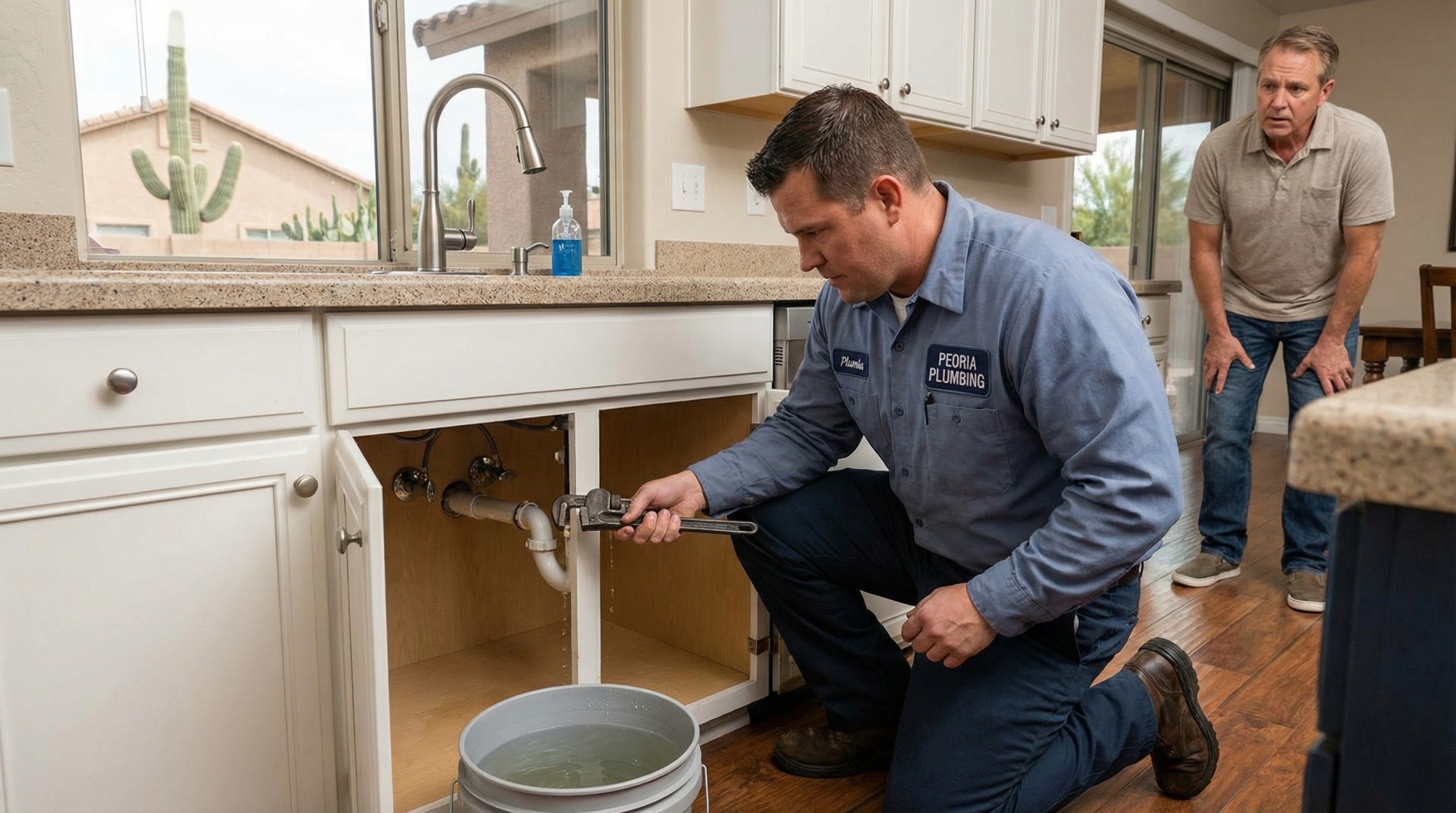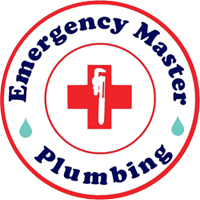

Living in Peoria, Arizona, comes with its share of perks—sunny skies, community vibes, and that classic Southwest charm. But when a plumbing leak strikes unexpectedly, it can turn your peaceful home into a watery nightmare. Emergency plumbing issues don’t wait for business hours; they flood basements, damage walls, and rack up repair bills faster than you can say “turn off the water.” If you’re a Peoria homeowner facing a sudden leak, knowing the essentials of emergency plumbing leak repair can save you time, money, and stress.
This guide breaks down everything you need to know: from spotting the signs early to understanding repair processes and prevention strategies. Whether it’s a dripping faucet escalating into a pipe burst or a hidden slab leak causing foundation woes, we’ll cover the causes, immediate steps, and when to call in professionals. By the end, you’ll feel equipped to handle—or at least mitigate—plumbing emergencies in your Peoria home.
Recognizing the Signs of a Plumbing Leak in Your Peoria Home
The first step in any emergency plumbing leak repair is identification. Ignoring subtle clues can lead to major damage, especially in Peoria’s hot climate where pipes under stress from temperature fluctuations are more prone to failure. Homeowners often overlook early warnings, but catching them quickly prevents escalation.
Start with visible signs. Water spots on ceilings or walls, especially in attics or crawl spaces, signal an overhead leak. In Peoria’s older homes, built in the mid-20th century, galvanized pipes can corrode, leading to brown stains or bubbling paint. On the floor, buckling tiles or warped hardwood around sinks and toilets point to subfloor moisture. If you notice musty odors or mold growth, that’s a red flag—leaks create damp environments perfect for mildew, which poses health risks like respiratory issues for your family.
Audible cues matter too. A constant dripping sound from walls or cabinets often indicates a pinhole leak in copper pipes, common in Peoria due to mineral-rich hard water. Listen for hissing or gurgling in drains; this could mean a sewer line issue backing up into your home. And don’t ignore the meter test: Turn off all water in your house and check if the meter still runs. If it does, a hidden leak is likely wasting hundreds of gallons daily, spiking your water bill by 10-20% or more.
For Peoria-specific challenges, consider the desert soil. Expansive clay around foundations can shift with seasonal rains, stressing underground pipes and causing slab leaks beneath concrete floors. These are sneaky—symptoms include warm spots on the floor (from hot water lines) or unexplained humidity in rooms. Early detection here is crucial, as undetected slab leaks can erode your home’s foundation, leading to costly structural repairs.
Common Causes of Plumbing Leaks and Why They Happen in Peoria
Understanding why leaks occur empowers homeowners to address root problems during emergency repairs. In Peoria, a mix of aging infrastructure, hard water, and extreme weather contributes to plumbing vulnerabilities.
High mineral content in local water accelerates buildup inside pipes, a process called scaling. Over time, this narrows pipe diameters, increasing pressure until joints fail. Tree roots are another culprit; Peoria’s mature landscapes mean invasive roots seek moisture from sewer lines, cracking clay or PVC pipes. During monsoon season, heavy rains can overwhelm septic systems, forcing backups and leaks.
Temperature extremes play a big role too. Peoria’s scorching summers (often exceeding 110°F) cause pipes to expand and contract, weakening solder joints in older homes. In winter, though milder, freezing nights can still burst exposed lines if insulation is poor. Appliance failures, like worn-out washing machine hoses or faulty water heaters, account for 20% of home leaks nationwide, and Peoria’s rapid growth means many newer homes have untested systems.
Wear and tear from daily use shouldn’t be underestimated. Faucets with loose cartridges or toilets with degraded flappers leak slowly but steadily, wasting up to 200 gallons per day per fixture. In multi-story Peoria residences, gravity-fed systems amplify pressure on lower-level pipes, hastening failures.
Immediate Steps for Handling an Emergency Plumbing Leak
When a leak hits, quick action minimizes damage. Follow these problem-solving steps to contain the issue until professionals arrive—vital in Peoria where water restrictions and high utility costs make every drop count.
First, shut off the main water supply. Locate your shut-off valve (usually near the water meter or in the garage) and turn it clockwise. If it’s a specific fixture leak, use the local shut-off under sinks or behind toilets. This stops the flow immediately, preventing further flooding.
Next, assess and contain. Mop up standing water with towels or a wet-dry vac to avoid slips and electrical hazards. For slab or wall leaks, avoid using the affected area and ventilate to reduce mold risk. Place buckets under drips and move valuables away from wet zones. If sewage is involved (look for foul smells or discoloration), evacuate and avoid contact—sewer leaks carry bacteria like E. coli.
Document everything for insurance. Take photos of the damage and note the time it started. In Peoria, many homeowners’ policies cover sudden leaks but not gradual ones, so proof helps claims. Call your utility company if the meter shows unusual usage; they may assist with external line issues.
Avoid DIY fixes for major leaks. Patching a pipe with tape might buy time, but it often fails under pressure, worsening the problem. Instead, focus on safety while awaiting help.
The Repair Process: What to Expect from Professional Emergency Plumbing Services
Professional intervention ensures lasting repairs, especially for complex Peoria emergencies like trenchless sewer fixes or epoxy pipe lining. Here’s what typically unfolds.
Upon arrival, technicians diagnose using tools like leak detectors, video cameras, and pressure gauges. For visible leaks, they isolate the section, drain the line, and cut out damaged pipe. PEX or copper replacements are common, soldered or crimped securely. In slab leaks, hydro-jetting clears clogs first, followed by rerouting lines through walls if needed—less invasive than breaking concrete.
For underground issues, pros use acoustic sensors to pinpoint leaks without digging. In Peoria’s rocky soil, this saves time and yard disruption. Sewer line repairs might involve pipe bursting, where a new line is pulled through the old one, minimizing excavation.
Post-repair, pressure testing confirms integrity, and water quality checks ensure no contamination. Expect costs from $150 for simple fixes to $5,000+ for full repipes, depending on scope. Timeframes vary: emergencies resolve in hours, while diagnostics take a day.
Choosing experienced locals matters. Certified plumbers follow Arizona codes, using lead-free materials and eco-friendly methods to comply with water conservation efforts.
Prevention Tips to Avoid Future Plumbing Leaks in Peoria Homes
Prevention beats cure every time. Implementing these strategies reduces emergency calls and extends your system’s life by years.
Schedule annual inspections. In Peoria, hard water demands quarterly drain cleaning to prevent scaling. Flush water heaters every six months to remove sediment, boosting efficiency and averting bursts.
Upgrade proactively. Replace rubber hoses on appliances every five years and install leak-detecting shut-off valves. For slab protection, consider water softeners to combat minerals—local installers report 30% fewer leaks in treated homes.
Insulate pipes in attics and exterior walls to handle Peoria’s heat swings. During remodels, opt for flexible PEX over rigid pipes for better durability. Monitor usage with smart meters; apps alert to anomalies, catching leaks early.
Landscaping wisely helps too. Keep trees 10-20 feet from pipes and use root barriers. For septic systems, pump every 3-5 years to avoid backups.
By staying vigilant, Peoria homeowners can safeguard their investments against plumbing pitfalls.
When to Call for Emergency Plumbing Leak Repair in Peoria
Not every drip needs an urgent response, but certain signs demand immediate action: gushing water, structural damage, or no-flow issues affecting multiple fixtures. Day or night, 24/7 services handle these to prevent escalation.
In Peoria’s growing suburbs, response times average 30-60 minutes for pros equipped for local conditions. Delaying can lead to mold, rot, or utility shutoffs—costly in a region where water is precious.
For reliable support, turn to trusted experts who know Peoria’s plumbing nuances inside out.
If you’re dealing with an emergency plumbing leak in Peoria, contact Emergency Master Plumbing & Air at 623-584-4706. Their team provides fast, expert repairs to get your home back to normal quickly and safely.
